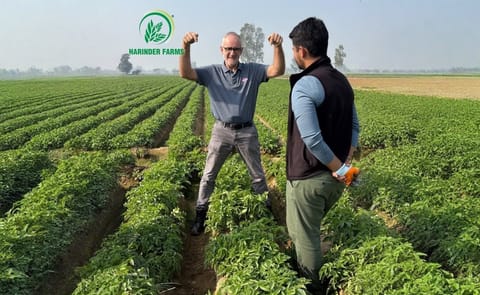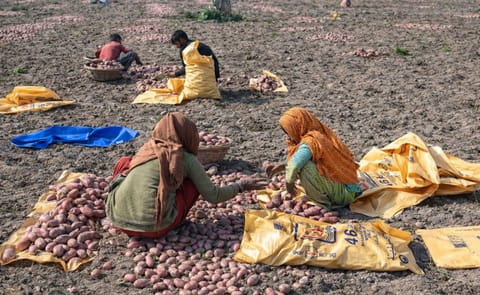This year, the potato harvest in Bangladesh was over 150% of the estimated domestic need of the country. As a result prices have crashed and despite the high yields farmers suffer as the can not sell their product (Courtesy: Anisur Rahman | The Daily Star)
Potato Farmers in Bangladesh suffer as a result of the huge surplus this year

The suffering of potato growers in Bangladesh is increasing day by day even though their yield is high, as they are stuck with surplus stocks and low exports.
Bangladesh is the seventh largest producer of the tuber crop. It produced a record high of 1.09 crore tonnes (10.9 million tonnes) last year, according to the De-partment of Agricultural Extension (DAE).
With an annual average demand of around 70 lakh tonnes (7 million tonnes), the country witnessed a surplus of about 40 lakh tonnes (4 million tonnes), most of which is wasted.
Not all of the surplus can be stored in the cold storages for low capacity, said experts.
For a lack of better use of the surplus, farmers are left with no option but to feed these potatoes to cattle, said growers.
Kamalaranjan Das, convener of the committee and additional secretary of the agriculture ministry:
“We are working to reduce farmers’ sufferings by examining the prospect of exporting local varieties. We are also looking at ways to strengthen our lab facilities to export disease free potatoes.”Russia and the European Union were potential markets for Bangladeshi potatoes, but those opportunities ended in 2015-16 when Russia found diseases in potatoes exported from Bangladesh and issued a temporary ban.
“We will submit a report to the ministry soon.”
The Russian Federal Service for Veterinary and Phytosanitary Surveillance said the potatoes from Bangladesh were infected by brown rot disease and potato tuber moth, as there is no accredited or standard lab in Bangladesh to test the quality of potatoes.
Bangladesh’s export of potato, the world’s fourth largest food crop after maize, wheat, and rice, reached a record high of over 100,000 tonnes in 2013-14, plummeting to 53,000 tonnes last year. It was 27,811.6 tonnes till April this year.
Manzurul Hannan, managing director of Hortex Foundation (Horticulture Export Development Foundation), said processed potato is the future of Bangladesh.
Manzurul Hannan:
“Yes, we could not increase our potato exports. But, last year, we exported potato flakes and crackers worth Tk 30 lakh (USD 35.000) to 26 countries.”Hannan, also a former director general of DAE, said some chips and crackers companies are also interested in processed potatoes and have started expanding their capacities.
Manzurul Hannan:
“We hope the situation will improve within a year as scientists are work-ing on the quality of the potatoes. Besides, the government is also paying special attention to it.”Bangladesh exports potatoes to Malaysia, Sri Lanka, Benin, Vietnam, Canada, Bahrain, Qatar, Myanmar, Nepal, Oman, Kuwait, Brunei, Saudi Arabia, United Arab Emirates and Singapore.
Russia has a demand for 2.6 crore tonnes of potatoes a year, facing a shortage of 50 lakh tonnes, said market sources. Bangladesh exported more than 20,000 tonnes of the crop to Russia -- out of 103,000 tonnes of potatoes exported in 2013-14 -- according to the agriculture ministry.
In 2015, Russia stopped importing from Bangladesh and suggested the latter to upgrade its phytosanitary system, security measures to prevent the use of fake phytosanitary certificates, and maintain proper inspection at ports to ensure shipment of safe agricultural produce.
The production of potatoes is increasing gradually in Bangladesh, and so is the surplus, according to data from DAE.
Shamsul Alom, deputy director (export) of the plant quarantine wing of DAE, said, the DAE has taken up contact farming in some places, to at-tract foreign buyers.
Shamsul Alom:
“If we can produce good quality potatoes through good practices, buyers will certainly be interested.”

Potato farmers in Bangladesh harvest potatoes in the Munshiganj’s Sirajdikhan upazila (Courtesy: Anisur Rahman | The Daily Star)
The product standard and quality that the European Union and Russia demand is very high and ultimately too expensive and not feasible for Bangladeshi farmers, she added.
Kazi Munni:
“There is also a section of dishonest businessmen who are exporting low quality products and creating a negative image of the country. There should be strict export guidelines in place.”Khawza Mia, a potato farmer in Rohobol village of Shibganj Upazila in Bogura, said they got good prices for their produce two years ago.
Khawza Mia:
“But ever since, prices have been falling.”Farmers in Bogura grew potatoes on 57,000 hectares of land this year and harvested 12,82,500 tonnes of the tuber crop.
Khawza Mia:
“We now sell a kilogram of potato for Tk 10, which was Tk 40 two years ago. If this situation continues, we will have to shift to farming other crops.”Farmers in Munshiganj, a potato farming hub in the country, grew the crop on 38,300 hectares of land this season, and got a yield of around 13 lakh tonnes.
Sirajul Islam Mir, a farmer in Katakhali village of the district, said he pro-duced 700 maunds of potatoes this year. He sold a maund for Tk 310, against a production cost of Tk 360.
Sirajul Islam Mir:
“Instead of selling my produce, I stored 170 maunds in my house for the low price. But even those are rotting by the day. In the last four years, I counted losses of almost Tk 22 lakh for potato farming.”Awlad Hossain, another famer in the village, spent Tk 170,000 to grow potatoes earlier this year, but he got only Tk 130,000 in return.
Humayun Kabir, deputy director of the district DAE, said there are 68 cold storages in the district with a capacity of around 5.5 lakh tonnes.
Humayun Kabir:
“Those are currently keeping around four lakh tonnes of potatoes. Farmers are not interested in selling them as market prices are low.”








